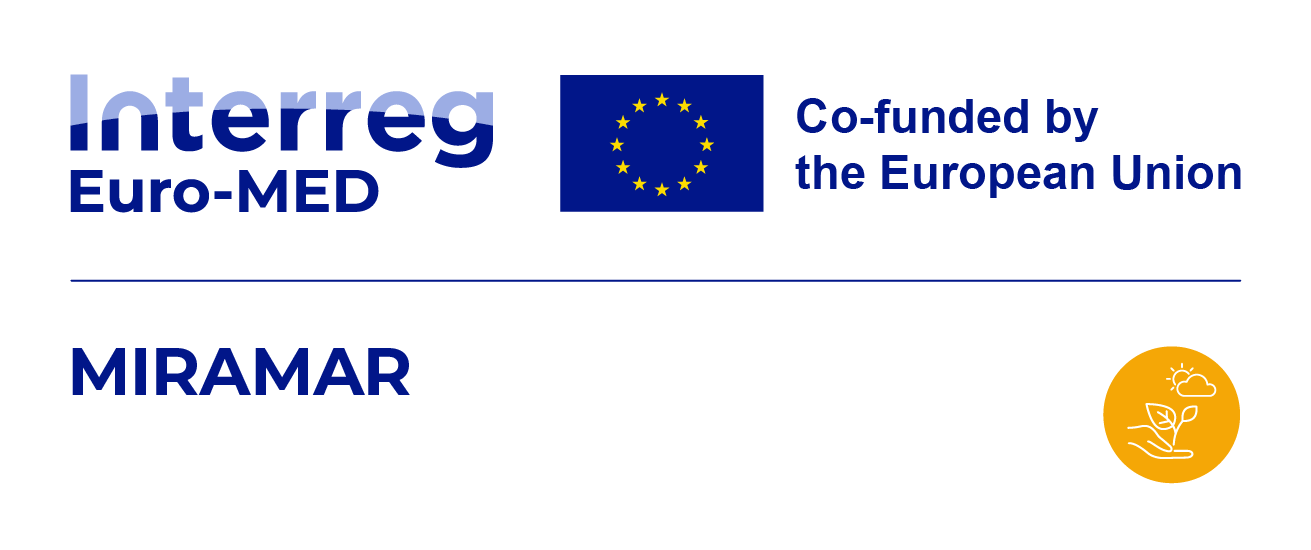The biodiversity of the Mediterranean Sea is under increasing threat from legacy and emerging contaminants, marine litter, noise and light pollution, invasive species and habitat destruction -all of which are driven by growing human activity and intensified by climate change.
In response to this challenge, MIRAMAR is bringing together fragmented knowledge to develop an integrated, cross-border approach to managing multiple environmental stressors. The project aims to generate robust, evidence-based insights to support long-term ecological stability and shared Mediterranean priorities.
Launched in April 2025, the 33-month project will design, test, and validate a new holistic monitoring method to identify suitable nature-based mitigation and restoration solutions.
MIO-ECSDE plays a pivotal role in the project by leading the work package dedicated to identifying solutions to multiple stressors and catalyzing change through the establishment of living labs. Drawing on its extensive capacity-building experience, it will also develop training materials and tools, and carry out pollutant and stressor testing in the Amvrakikos Gulf (Greece).

- Level of completion 5%
The aim of the MIRAMAR project is to develop a joint approach to improve our understanding of, and response to, the combined effects of different environmental pressures on three vital ecosystems in the Euro-Mediterranean region: seagrass meadows, wetlands and habitats of endangered species.
MIRAMAR will design, test, and validate a new holistic monitoring method to identify suitable nature-based mitigation and restoration solutions.
By aligning with regional and national monitoring strategies, as well as the management plans of protected areas, MIRAMAR will tackle the shared challenge of preventing, mitigating and restoring environmental degradation across these vital ecosystems.
Working across nine pilot areas in six Mediterranean countries — Albania, Croatia, France, Greece, Italy and Spain — MIRAMAR will:
- monitor how multiple stressors affect vulnerable ecosystems
- test harmonised, innovative methods for data collection and analysis
- co-develop nature-based solutions for mitigation and restoration
- align actions with key European, Mediterranean and EuroMediterranean environmental policy frameworks
MIRAMAR will produce a set of concrete, high-value deliverables aimed at supporting environmental monitoring, management and policy action across the Mediterranean:
- Harmonised strategies to monitor the cumulative impact of multiple stressors in degraded ecosystems
- Toolkits for assessing combined effects of pollution, invasive species and habitat degradation
- Assessment on the cumulative impact of multiple stressors in the nine pilot areas
- Good Practices, developed through Living Labs, illustrating successful examples of restoration and mitigation
- Training on monitoring cumulative impact and identifying pollution mitigation and restoration solutions
The overall experience and lessons learned from MIRAMAR will be translated into strategic results, designed for long-term use and replication:
- Harmonised monitoring protocols
- Operational roadmaps for ecosystem mitigation and restoration
- Evidence-based tools and guidelines to support environmental governance
- Cross-sectoral engagement models (e.g. Living Labs, stakeholder co-creation)
- Policy-aligned frameworks to guide decision-makers in the Mediterranean region
- University of Siena (UNISI) – Italy
- Mediterranean Information Office for Environment, Culture and Sustainable Development (MIO-ECSDE) – Greece
- Spanish National Research Council (IEO-CSIC) – Spain
- Hellenic Centre for Marine Research (HCMR) – Greece
- Stazione Zoologica Anton Dohrn – Italy
- Ministry of Tourism and Environment of Albania – Albania
- Ruđer Bošković Institute – Croatia
- Corsican Environment Office (Office de l’Environnement de la Corse) – France
Title:Monitoring cumulative Impact to guide mitigation and RestorAtion in the MediterrAnean Region (MIRAMAR)
Funding instrument: Interreg Euro-MED
Mission: Natural Heritage
Specific objective: Enhancing protection and preservation of nature, biodiversity and green infrastructure, including in urban areas, and reducing all forms of pollution
Project duration: 33 months (April 2025 – December 2027)
Project budget: € 2.500.000